Ecopoetics and the Global Landscape
Ecocritical Theory and Practice
Series Editor: Douglas A. Vakoch, METI
Advisory Board:
Bruce Allen, Seisen University, Japan; Zlia Bora, Federal University of Paraba, Brazil; Izabel Brando, Federal University of Alagoas, Brazil; Byron Caminero-Santangelo, University of Kansas, USA; Simo Farias Almeida, Federal University of Roraima, Brazil; George Handley, Brigham Young University, USA; Steven Hartman, Mlardalen University, Sweden; Isabel Hoving, Leiden University, The Netherlands; Idom Thomas Inyabri, University of Calabar, Nigeria; Serenella Iovino, University of Turin, Italy; Daniela Kato, Kyoto Institute of Technology, Japan; Petr Kopeck, University of Ostrava, Czech Republic; Serpil Oppermann, Hacettepe University, Turkey; Christian Schmitt-Kilb, University of Rostock, Germany; Heike Schwarz, University of Augsburg, Germany; Murali Sivaramakrishnan, Pondicherry University, India; Scott Slovic, University of Idaho, USA; J. Etienne Terblanche, North-West University, South Africa; Julia Tofantuk, Tallinn University, Estonia; Cheng Xiangzhan, Shandong University, China; Hubert Zapf, University of Augsburg, Germany
Ecocritical Theory and Practice highlights innovative scholarship at the interface of literary/cultural studies and the environment, seeking to foster an ongoing dialogue between academics and environmental activists.
Recent Titles
The Human-Animal Boundary: Exploring the Line in Philosophy and Fiction
edited by Mario Wenning and Nandita Batra
Towards the Rivers Mouth (Verso la foce), Gianni Celati, A Critical Edition
edited, translated, and introduced by Patrick Barron
Gender and Environment in Science Fiction
edited by Bridgitte Barclay and Christy Tidwell
Ecological Crisis and Cultural Representation in Latin America: Ecocritical Perspectives on Art, Film, and Literature
edited by Mark Anderson and Zelia M. Bora
Confronting Climate Crises through Education: Reading Our Way Forward
by Rebecca Young
Environment and Pedagogy in Higher Education
edited by Lucie Viakinnou-Brinson
Nordic Narratives of Nature and the Environment: Ecocritical Approaches to Northern European Literatures and Cultures
edited by Reinhard Hennig, Anna-Karin Jonasson, and Peter Degerman
Ecocriticism, Ecology, and the Cultures of Antiquity
Edited by Christopher Schliephake
Ecopoetics and the Global Landscape
Critical Essays
Edited by Isabel Sobral Campos
Lexington Books
Lanham Boulder New York London
Published by Lexington Books
An imprint of The Rowman & Littlefield Publishing Group, Inc.
4501 Forbes Boulevard, Suite 200, Lanham, Maryland 20706
www.rowman.com
6 Tinworth Street, London SE11 5AL, United Kingdom
Copyright 2019 The Rowman & Littlefield Publishing Group, Inc.
Cecilia C. T. Perez, Signs of Being: A Chamorro Spiritual Journey. Masters thesis, University of Hawaii, Mnoa, 1997.
Continents End, copyright 1924 and renewed 1952 by Robinson Jeffers; The Bed by the Window, 1925, 1929 & renewed 1953, 1957 by Robinson Jeffers; and Excesses of God from THE SELECTED POETRY OF ROBINSON JEFFERS by Robinson Jeffers, copyright 1925, 1929 and renewed 1953, 1957 by Robinson Jeffers. Used by permission of Random House, an imprint and division of Penguin Random House LLC. All rights reserved.
Eagle Pair from NEW SELECTED POEMS by Les Murray. Copyright 2007, 2012, 2014 by Les Murray. Reprinted by permission of Farrar, Straus and Giroux.
Excerpts from At the Fishhouses and The Moose from POEMS by Elizabeth Bishop. Copyright 2011 by The Alice H. Methfessel Trust. Reprinted by permission of Farrar, Straus and Giroux.
From Poems by Elizabeth Bishop . Published by Chatto & Windus . Reprinted by permission of The Random House Group Limited. 2011.
Joy Harjo, How We Became Human: New and Selected Poems: 19752001 (New York: Norton and Company, 2002).
The Everlasting. Copyright 2002 by Joy Harjo, from HOW WE BECAME HUMAN: NEW AND SELECTED POEMS: 1975-2001 by Joy Harjo. Used by permission of W. W. Norton & Company, Inc.
Will Alexander, Exobiology as Goddess (San Jose, CA: Manifest Press, 2004).
All rights reserved . No part of this book may be reproduced in any form or by any electronic or mechanical means, including information storage and retrieval systems, without written permission from the publisher, except by a reviewer who may quote passages in a review.
British Library Cataloguing in Publication Information Available
Library of Congress Cataloging-in-Publication Data
ISBN 978-1-4985-4720-8 (cloth : alk. paper)
ISBN 978-1-4985-4721-5 (electronic)
 The paper used in this publication meets the minimum requirements of American National Standard for Information SciencesPermanence of Paper for Printed Library Materials, ANSI/NISO Z39.48-1992.
The paper used in this publication meets the minimum requirements of American National Standard for Information SciencesPermanence of Paper for Printed Library Materials, ANSI/NISO Z39.48-1992.
Printed in the United States of America
Acknowledgments
I would like to thank Douglas A. Vakoch for encouraging me to pursue this project with Lexington Books, as well as Lindsey Falk and Nick Johns for all their editorial help and attentiveness during this long process. Thanks to Douglas Coe, Dean of the College of Letters, Sciences and Professional Studies at Montana Tech, for reducing my teaching responsibilities so I could devote more time to this manuscript, as well as Scott Risser for all his support as Department Chair of Montana Techs Liberal Studies. Thanks to the anonymous peer-reviewer, whose comments greatly improved this manuscript, as well as David Tagnani for giving me valuable feedback on my own essay. This book would not have been possible without the work and devotion of all contributors, for which I am very grateful. I would like to thank Will Alexander and Cecilia Perez for kindly allowing myself and Craig Santos Perez, respectively, permission to quote from their poems; editors Karen Thornber and Tom Havens for giving permission to reprint John Ryans essay No More Boomerang: Environment and Technology in Contemporary Aboriginal Australian Poetry; and Random House as well as Farrar, Straus and Giroux for granting copyright permission to quote from Elizabeth Bishops The Moose and At the Fishhouses in Cheryl Alisons Noticing with Bishop: Curiosity and The Moose. Finally, I would like to thank my wonderful and loving partner, Kristofer Petersen-Overton, for all the hours he generously devoted to the proofreading of this manuscript as well as all moral and intellectual encouragement he tirelessly offered.
Introduction
Transnational Ecopoetics
Isabel Sobral Campos
Timothy Morton opens his recent book Dark Ecology with a section entitled Beginning after the End. This paradoxical notion poignantly captures the challenges inherent in imagining a future on a planet in ecological peril. What is dark ecology? Timothy Morton asks. It is ecological awareness, dark-depressing. Yet ecological awareness is also dark-uncanny. The dark-uncanny is not the terminal stage of this ecology: [W]e are going to try, he offers, to get to the third darkness, the sweet one, through the second darkness, the uncanny one. The weirdness of ecological awareness and responsibility, the immense and irreversible destruction that has already taken place can perhaps be more successfully approached through art, which is thought from the future, and so perhaps more equipped to think [t]his future [which] is unthinkable. How thought longs to twist and turn like the serpent poetry! Morton hints at the specificity of poetry as particularly capable of thinking the unthinkable through verbal twists and turns and a subversion of linguistic commonplaces. In doing so, poetry profoundly alters how we see, what we see, and how we relate our being to both visible and invisible processes.
Next page
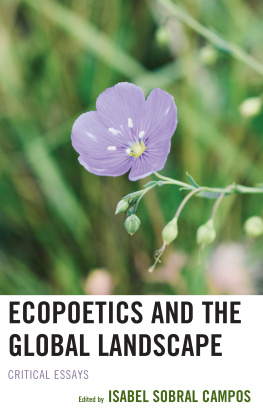
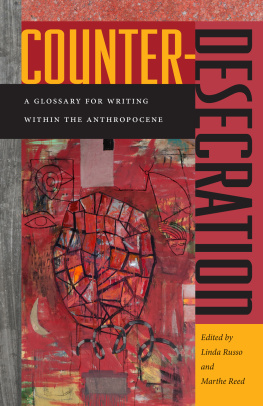


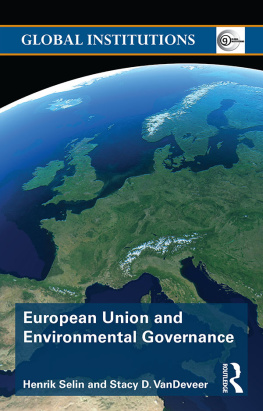
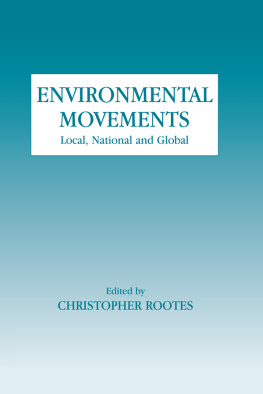
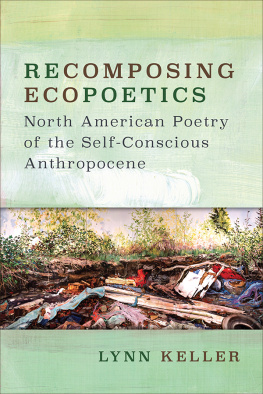
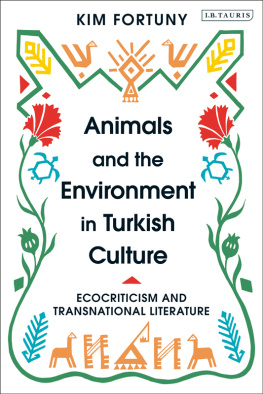
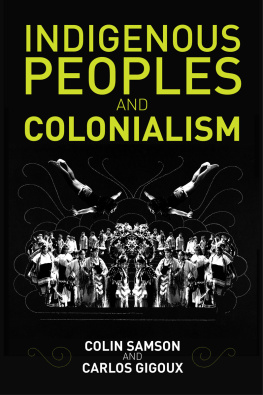
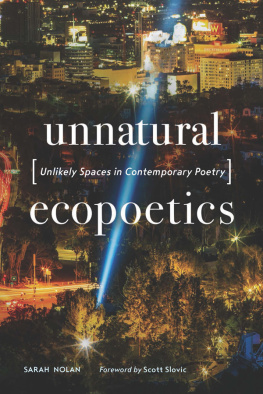
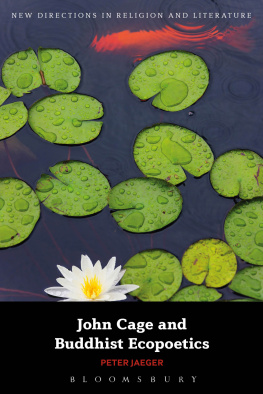
 The paper used in this publication meets the minimum requirements of American National Standard for Information SciencesPermanence of Paper for Printed Library Materials, ANSI/NISO Z39.48-1992.
The paper used in this publication meets the minimum requirements of American National Standard for Information SciencesPermanence of Paper for Printed Library Materials, ANSI/NISO Z39.48-1992.